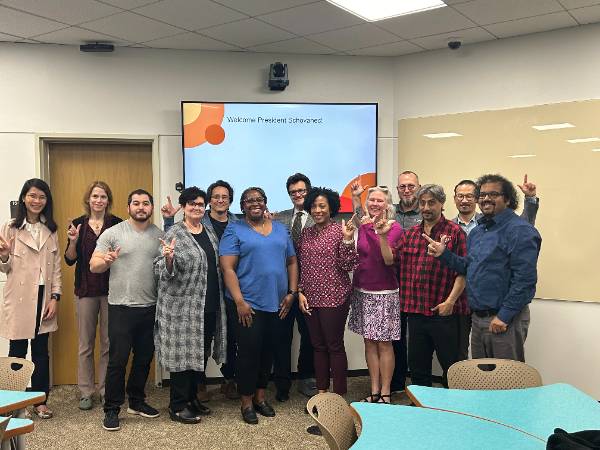President's STEM Mentoring Academy

The President’s STEM Mentoring Academy is designed to support faculty who mentor STEM undergraduate students. The program provides resources to help increase the success of your mentees and creates a collaborative environment for STEM faculty to foster professional and personal growth. Membership in the Academy formally acknowledges the vital role that faculty play in mentoring STEM students at Texas Tech University. President’s STEM Mentoring Academy is open to all TTU faculty.
What do faculty gain from PSMA?
As a STEM faculty member, you know that mentoring students in the discovery process helps cultivate the next generation of scientists. Mentoring means more than simply teaching a student how to collect and analyze data. When you accept a student to work with you on research, you also mentor them in the culture of science, professionalism, and life.
In the President’s STEM Mentoring Academy (PSMA), you will develop your skills as a mentor outside your role of teaching students how to “do science.” This professional development will require time, self-reflection, and honest feedback. In addition, you will learn about challenges faced by your students, how to create strategies for promoting the growth and success of your students, and gain experience and confidence as a better mentor.
Event Dates for President's STEM Mentoring Academy
Applications will open towards the end of the summer and early fall.
We will host 6 three-hour afternoon working sessions throughout the academic year (two are virtual) that members are expected to attend. There will be two in the fall and four in the spring, along with a banquet in April. Please note, if you are accepted to PSMA, you are expected to be present at ALL dates and times (pending an emergency). The dates for the 2025 - 2026 academic year are as follows:
- Monday, September 22: 2 - 5 PM - In person
- Monday, October 20: 2 - 5 PM - Virtual
- Monday, January 26: 2 - 5 PM - In person
- Monday, Febrauary 23 : 2 - 5 PM - Virtual
- Monday, March 30: 2 - 5 PM - In person
- Monday, April 20: 2 - 5 PM - In person
Note: Meeting invites will be sent out confirming dates and locations once you are accepted to the program.
Session Information
Each session will include designated work time within each PD session
● Workshops on formal and informal mentoring
● Workshops and activities for faculty to unpack their practices that support engagement, motivation, and STEM program success for students
● Practices focused on building relationships with students, faculty, and staff
● 1:1 and small group time to build a personalized mentoring plan
● STEM content analyses of mentoring plans
● Pedagogical analyses of how faculty are enacting their mentoring plan
Questions?
If you have questions, please contact Nancy McIntyre at nancy.mcintyre@ttu.edu.
STEM CORE
-
Address
1008 Canton Ave Lubbock, TX 79409-1087 -
Phone
806.742.0218 -
Email
stem-core@ttu.edu
